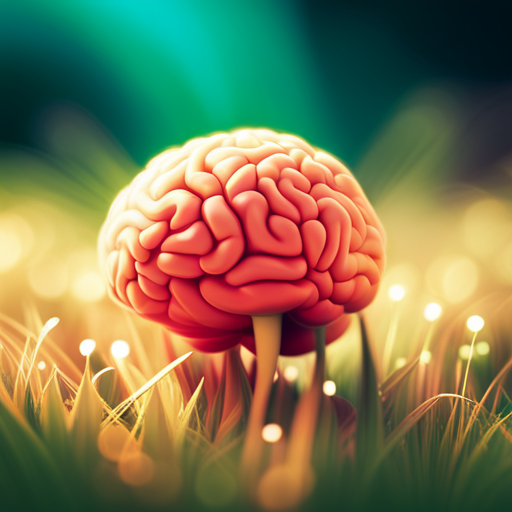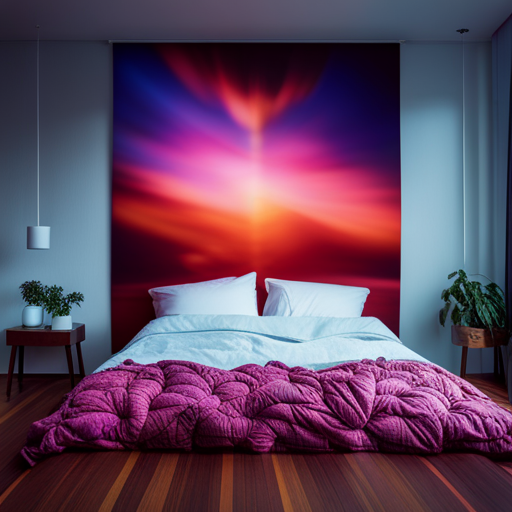Have you ever woken up from a very realistic dream, feeling like you just lived in a completely different world? Dreams have always intrigued humans and their vividness is incredibly interesting. As a sleep researcher, I have extensively studied the scientific reasons behind these vivid dreams. Through thorough research and analysis, I have discovered numerous factors that affect the intensity and clarity of our dream experiences.
Drawing upon the technique of allusion, we can understand that dreams are like a window into the depths of our subconscious mind. They provide a glimpse into our innermost thoughts, emotions, and desires. Just as a painting beautifully portrays the artist’s thoughts and emotions, our dreams vividly depict the intricacies of our psyche.
In this article, we will explore the various factors that influence dream vividness. From the role of REM sleep and emotional states to the impact of sleep disorders and medications, we will delve into the scientific evidence that sheds light on this enigmatic phenomenon.
Additionally, we will explore the connection between dream recall and vividness, as well as the influence of external stimuli and psychological factors.
So, fasten your seatbelts as we embark on a scientific journey to unravel the mysteries of what causes such vivid dreams. Through evidence-based analysis, we will gain a deeper understanding of the complex mechanisms that shape our dream experiences.
Key Takeaways
- Factors such as REM sleep, emotional states, sleep disorders, and external stimuli influence the vividness of dreams.
- Emotional intensity and vivid imagination contribute to more intense dream experiences.
- Sleep disorders like insomnia or sleep apnea can impact dream quality and recall, leading to reduced dream intensity.
- Dream recall and memory play a role in the perception of dream vividness, with clear recollection making dreams feel more lifelike and lack of recall resulting in fragmented and less vivid dreams.
The Role of REM Sleep in Dream Formation
REM sleep is when our brains go into full-on dream mode, creating those wild and vivid adventures that leave us wondering what on earth just happened. During REM sleep, our brain activity increases and becomes similar to that of wakefulness. This stage of sleep is characterized by rapid eye movements, hence the name REM, and is associated with dreaming.
The duration of REM sleep varies throughout the night, with each cycle of sleep becoming longer, allowing for more vivid dreams to occur towards the end of the night.
Dreams experienced during REM sleep can cover a wide range of themes. They may involve familiar or unfamiliar people, places, or events. Some common dream themes include flying, falling, being chased, or taking exams. These themes can be influenced by our daily experiences, memories, and emotions.
For example, if we have recently watched a movie about superheroes, we may dream about having superpowers or saving the world. Our dreams can also reflect our emotional states, such as dreams of stress or anxiety during periods of high pressure.
The influence of emotional states on dream intensity will be explored in the subsequent section. Emotions play a crucial role in dream formation, and understanding their impact on dream content can provide valuable insights into the workings of our subconscious mind.
The Influence of Emotional States on Dream Intensity
When you’re feeling strong emotions, like fear or excitement, your dreams can become incredibly intense. This is because emotional states have a significant influence on the intensity of our dreams. Research has shown that individuals with higher emotional stability tend to have more vivid and intense dreams compared to those with lower emotional stability.
One possible explanation for this phenomenon is that emotional experiences during wakefulness can carry over into our dreams. For example, if we experience a particularly stressful event during the day, our brain may process and incorporate this emotional experience into our dreams during REM sleep. This can result in dreams that are filled with intense emotions and vivid imagery.
Dream symbolism is another factor that contributes to the intensity of our dreams. Dreams often use symbolic representations to express our emotions and desires. For instance, a dream about falling may symbolize a feeling of insecurity or loss of control. By analyzing the symbolism in our dreams, we can gain insights into our emotional state and subconscious thoughts.
Understanding the influence of emotional states and dream symbolism on dream intensity can provide valuable insights into the workings of the human mind. Transitioning into the subsequent section about the impact of sleep disorders on dream quality, it is important to explore how these conditions can disrupt the emotional aspects of our dreams and affect our overall sleep experience.
The Impact of Sleep Disorders on Dream Quality
Sleep disorders, such as insomnia or sleep apnea, can throw a wrench in the works of our dream quality and make our sleep experience a real nightmare. When we suffer from sleep disorders, it can have a significant impact on our ability to recall our dreams.
Research has shown that individuals with insomnia tend to have lower dream recall compared to those without sleep disorders. This suggests that the disrupted sleep patterns associated with insomnia can interfere with the brain’s ability to consolidate and process dream memories.
Additionally, the role of stress in dream intensity cannot be ignored. Stress is known to disrupt sleep and can lead to the development of sleep disorders. When we’re stressed, our bodies produce higher levels of stress hormones, such as cortisol, which can interfere with the natural sleep cycle. This can result in fragmented sleep and decreased dream intensity.
Sleep disorders can have a negative impact on dream quality, including dream recall and intensity. The disrupted sleep patterns associated with sleep disorders, such as insomnia or sleep apnea, can interfere with the brain’s ability to consolidate and process dream memories.
Furthermore, the role of stress in dream intensity cannot be overlooked. Stress can disrupt sleep and lead to the development of sleep disorders, further impacting dream quality. Moving forward, it’s important to also consider the effect of medications and substances on dream vividness.
The Effect of Medications and Substances on Dream Vividity
The impact of medications and substances on dream intensity cannot be underestimated. There are various recreational drugs that can affect the vividness of dreams. For example, substances like marijuana and hallucinogens have been known to enhance dream intensity. These drugs alter the brain’s chemistry, leading to more vivid and memorable dreams. However, the long-term effects of these substances on dream quality are still not fully understood and require further research.
In addition to recreational drugs, certain medical conditions can also have an impact on dream vividness. Conditions such as sleep apnea, insomnia, and restless leg syndrome can disrupt the sleep cycle and affect the quality of dreams. Sleep apnea, for instance, is characterized by pauses in breathing during sleep, which can lead to fragmented sleep and reduced dream intensity.
To provide a visual representation of these ideas, the following table summarizes the effect of medications and substances, as well as certain medical conditions, on dream vividness:
| Mediations/Substances | Effect on Dream Intensity |
|---|---|
| Recreational drugs | Increased vividness |
| Certain medical conditions | Decreased vividness |
Understanding the impact of medications, substances, and medical conditions on dream vividness is crucial for exploring the connection between dream recall and vividness. Transitioning into the subsequent section, it is important to consider how dream recall can influence the perception of dream intensity.
The Connection Between Dream Recall and Vividness
To fully grasp the connection between dream recall and how vivid your dreams feel, it’s important for you to understand that the more you remember your dreams, the more likely they are to seem incredibly real and intense. Dream recall and memory play a significant role in the perception of dream vividness.
When you have a clear recollection of your dreams, your brain is able to reconstruct the details and sensations more accurately, making the experience feel more lifelike. In contrast, when you have little to no recall of your dreams, the memories become fragmented and the dream seems less vivid.
The role of dream interpretation also plays a part in understanding dream vividness. Dream interpretation allows you to explore the symbolism and meanings behind your dreams, which can enhance your understanding of their vividness. By analyzing the content of your dreams and identifying any underlying emotions or experiences, you can gain insight into why certain dreams feel more intense than others.
Dream recall and memory, as well as dream interpretation, contribute to the perception of dream vividness. The more you remember your dreams and delve into their meanings, the more vivid and intense they may appear. Understanding these factors is crucial in unraveling the mysteries of dream formation and vividness.
Transitioning into the next section, we will explore the role of brain activity and neurotransmitters in the creation of dreams.
The Role of Brain Activity and Neurotransmitters in Dream Formation
Transitioning from the previous subtopic about the connection between dream recall and vividness, we now delve into the role of brain activity and neurotransmitters in dream formation. Understanding the biochemical processes that occur during sleep can provide insights into why dreams can be so vivid and lifelike.
During sleep, the brain undergoes various changes in its chemistry and electrical activity. Research has shown that certain neurotransmitters, such as acetylcholine and serotonin, play a crucial role in regulating these changes. Acetylcholine, for instance, is responsible for promoting rapid eye movement (REM) sleep, the stage in which most vivid dreaming occurs. Serotonin, on the other hand, influences the intensity and emotional content of dreams.
To illustrate the complex interplay between brain chemistry, sleep patterns, and dream formation, consider the following table:
| Neurotransmitter | Role in Dream Formation |
|---|---|
| Acetylcholine | Promotes REM sleep and vivid dreaming |
| Serotonin | Influences dream intensity and emotional content |
By understanding the specific actions of these neurotransmitters, we can begin to unravel the mechanisms behind the creation of vivid dreams. However, it is important to note that the influence of external stimuli on dream content cannot be overlooked.
The Influence of External Stimuli on Dream Content
External stimuli, like sounds or smells, can totally impact what we dream about. One external stimulus that can influence dream content is music. Research has shown that listening to certain types of music before sleep can result in more vivid and emotionally charged dreams.
For example, studies have found that listening to calming classical music can lead to dreams that are peaceful and serene, while listening to intense or fast-paced music can lead to dreams that are more exciting or even disturbing.
Additionally, stress is another external factor that can greatly impact dream content. When we’re under high levels of stress, our brain becomes hyperactive, leading to more intense and vivid dreams. This is because stress activates the amygdala, the part of the brain responsible for processing emotions, which can result in dreams that are filled with anxiety, fear, or other negative emotions.
In conclusion, external stimuli, such as music and stress, can significantly influence the content of our dreams.
Moving on to the next section, psychological factors also play a crucial role in contributing to vivid dreaming.
Psychological Factors That Contribute to Vivid Dreaming
Imagine your mind as a vast canvas, where the colors and strokes of your thoughts and emotions come to life in your dreams. Dream analysis has long been a subject of fascination, as it provides a window into the subconscious mind. One factor that contributes to the vividness of dreams is psychological factors.
Certain psychological states and traits can influence the intensity and clarity of our dream experiences. There are several key psychological factors that play a role in vivid dreaming.
First, individuals who have a higher level of emotional intensity tend to experience more vivid dreams. This means that people who are generally more emotionally sensitive or expressive may have more intense dream experiences.
Second, individuals who engage in frequent daydreaming or have a vivid imagination often report more vivid dreams. This suggests that the ability to create and visualize mental images during waking life may also contribute to the richness of dream content.
Additionally, research has shown that individuals who have a tendency towards lucid dreaming, or the ability to be aware that they are dreaming while still in the dream state, may also experience more vivid dreams. Lucid dreaming allows individuals to actively participate and manipulate their dreams, which can lead to more engaging and intense experiences.
Incorporating these psychological factors into the study of dream analysis provides valuable insights into the relationship between dreams and creativity. Understanding how our mental and emotional states influence the vividness of our dreams can shed light on the role of dreams in the creative process and the potential for harnessing the power of dreams to enhance creativity and problem-solving abilities.
The Relationship Between Dreams and Creativity
In my exploration of the psychological factors that contribute to vivid dreaming, I’ve uncovered a fascinating relationship between dreams and creativity. Research suggests that dreams play a crucial role in problem-solving and artistic inspiration.
When we dream, our brain enters a state of heightened creativity, allowing us to explore new ideas and concepts. Dreams can provide a unique perspective on unresolved problems, offering fresh insights and innovative solutions. Many renowned artists and inventors throughout history have attributed their creative breakthroughs to their dreams. For example, Paul McCartney famously composed the melody for the iconic song ‘Yesterday’ in a dream.
Furthermore, dreams have been found to enhance artistic inspiration by providing a rich source of imagery and symbolism. Artists often draw inspiration from their dreams, incorporating dream-like elements into their artwork. This connection between dreams and creativity highlights the profound influence our dream experiences can have on our waking lives.
As I delve deeper into the topic of enhancing dream vividness and recall, it becomes evident that understanding the relationship between dreams and creativity is crucial. By harnessing the power of our dreams, we may unlock new realms of imagination and innovation.
Techniques for Enhancing Dream Vividness and Recall
One effective way to improve the clarity and remembrance of our dreams is by keeping a dream journal. Dream journaling involves recording our dreams as soon as we wake up, in as much detail as possible. This practice not only helps us remember our dreams more vividly, but it also enhances our ability to have lucid dreams.
Lucid dreams are dreams in which we become aware that we’re dreaming while still in the dream itself. By keeping a dream journal, we can identify recurring patterns or themes in our dreams, which can serve as triggers for lucidity. For example, if we notice that we often dream about flying, we can use this as a cue to question our reality and realize that we’re dreaming.
In addition to recording our dreams, it’s also helpful to write down any emotions, sensations, or thoughts we experienced during the dream. This can provide further insight into the meaning and significance of our dreams. By consistently practicing dream journaling, we can train our brains to pay more attention to our dreams and enhance our overall dream recall and vividity.
Overall, dream journaling is a scientifically supported technique for enhancing lucid dreams and improving dream clarity. By actively engaging with our dreams through the practice of dream journaling, we can unlock the potential for deeper self-awareness and exploration within our dream world.
Frequently Asked Questions
How long does REM sleep typically last during a sleep cycle?
During a sleep cycle, REM sleep typically lasts for about 20 to 25% of the total sleep time. This crucial stage is characterized by rapid eye movement and heightened brain activity.
Sleep deprivation can have detrimental effects on REM sleep, leading to decreased overall sleep quality and an increased likelihood of experiencing vivid dreams.
To improve the quality of REM sleep, it’s important to prioritize good sleep hygiene, maintain a consistent sleep schedule, and create a comfortable sleep environment.
Can certain emotions or psychological states lead to more frequent vivid dreams?
Certain emotions and psychological states can indeed lead to more frequent vivid dreams. The emotional impact of events that occur during waking hours can influence the content and intensity of dreams during REM sleep. Research has shown that emotions such as fear, anxiety, and stress can increase the occurrence of vivid dreams.
Additionally, individuals with heightened emotional sensitivity or those who engage in active dream interpretation practices may also experience more frequent and vivid dreams.
What are some common sleep disorders that may affect the quality of dreams?
Common sleep disorders can have a significant impact on the quality of dreams. One interesting statistic is that approximately 50 to 80 percent of people with insomnia report experiencing poor dream recall and less vivid dreams.
Insomnia, a common sleep disorder characterized by difficulty falling or staying asleep, can disrupt the normal sleep cycle and affect the different stages of sleep where dreams occur.
Additionally, sleep apnea, restless leg syndrome, and narcolepsy are other sleep disorders that can also impact dream quality.
Which medications or substances are known to increase the vividness of dreams?
Medications and substances can have varying effects on dream recall and intensity. Certain antidepressants, such as selective serotonin reuptake inhibitors (SSRIs), have been reported to increase dream vividness.
Other substances like nicotine, alcohol, and marijuana may also impact dream intensity, although the exact mechanisms are not fully understood.
It’s important to note that individual responses to these medications and substances may differ, and further research is needed to fully understand their effects on dream experiences.
Is there a correlation between the ability to recall dreams and the intensity of the dreams themselves?
There’s evidence to suggest that there’s a correlation between the ability to recall dreams and the intensity of the dreams themselves. Several studies have found that individuals who have better dream recall also report more vivid and intense dreams.
This may be due to increased attention and focus on dream experiences, leading to improved dream recall and a greater awareness of dream content.
Further research is needed to fully understand the relationship between dream recall and dream intensity, as well as how it relates to dream interpretation and lucid dreaming.
Conclusion
In conclusion, the intricacies of dream formation and the factors that contribute to their vividness are indeed fascinating. From the role of REM sleep to the influence of emotional states, sleep disorders, medications, and external stimuli, it’s clear that there are numerous elements at play.
While it may seem ironic that something as ephemeral as dreams can have such a scientific and evidence-based explanation, it’s precisely this blend of the mysterious and the empirical that makes the study of dreams so captivating.
Sweet dreams, dear readers, and may your subconscious continue to surprise and delight you.









